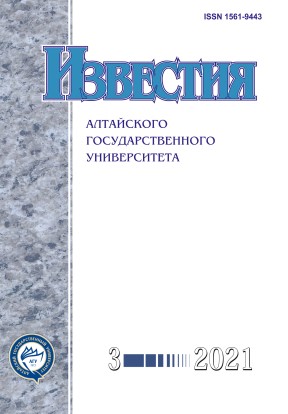The Organization of Labor of Disabled People in the Kuznetsk District in the Second Half of the 1920-s-1930-s
УДК 94(571.17).084 ББК 63.3 (2Рос-4Кем)61-2)
Abstract
The organization of labor activities of disabled people in the territory of the Kuznetsk District in the second half of the 1920s - 1930s is being considered in the article. The dynamics of the development of the system of disability cooperation is shown. The study examined working conditions, the pay system, its advantages compared to the receipt of a tiny pension. Opportunities to train persons with disabilities in professions within the technical training plant have been identified. The main types of production activities in which disabled artels specialized were established, these are: artisanal production of food, basic necessities, trade and household services. The conclusion is drawn that economic problems of artels arose in connection with weak financial support from social securities, supply with raw materials and materials by the residual principle, domination of manual work, formal work of local councils with chairmen of the artels allowing cases of mismanagement and abuse of official position. In general, the level of organization of work of persons with disabilities in the Kuznetsk District was in line with the State’s policy of pragmatising their productive potential during the period of intensive industrial construction in the region.
Downloads
Metrics
References
Милютин Н.А. Социальное обеспечение в условиях НЭПа // Вопросы социального обеспечения. 1921. № 5-6.
Семашко Н.А. Право социального обеспечения. Издание второе, исп. и доп. М., 1938.
Ефанов Л.Д. Крестьянская взаимопомощь Сибири (Из опыта партийного руководства кресткомами, 1921-1932 гг.). Томск, 1982.
Флястер М.И. Правовое регулирование труда инвалидов в СССР : автореф. дис. .канд. юрид. наук. М., 1962.
Шалугина И.Б. Социальное обеспечение в РСФСР в 20-е годы : автореф. дис. .канд. ист. наук. М., 1990.
Гениш Э. Социальная реабилитация инвалидов войны и труда в системе кооперативных предприятий в 20-30-е годы XX века: На материалах областей ВерхнеВолжского региона : дис. .канд. ист. наук. Кострома, 2005.
Кошкин Д.С. Государственная политика и практика социальной работы с инвалидами в 20-30-е годы XX века: на материалах РСФСР : дис. . канд. ист. наук. М., 2001.
Ковалёв А.С. Реализация социальной политики Советского государства в отношении нетрудоспособного населения Сибири в 1920-1930-х гг. : дис. ... д-ра ист. наук. Барнаул, 2016.
Государственный архив Кемеровской области (ГАКО). Ф. Р-6. Оп. 1. Д. 12.
Вопросы социального обеспечения. 1925. № 5.
ГАКО. Ф. Р-219. Оп. 1. Д. 2.
ГАКО. Ф. Р-219. Оп. 1. Д. 8а.
ГАКО. Ф. Р-219. Оп. 1. Д. 10.
ГАКО. Ф. Р-18. Оп. 1. Д. 549.
ГАКО. Ф. Р-18. Оп. 1. Д. 875.
Izvestiya of Altai State University is a golden publisher, as we allow self-archiving, but most importantly we are fully transparent about your rights.
Authors may present and discuss their findings ahead of publication: at biological or scientific conferences, on preprint servers, in public databases, and in blogs, wikis, tweets, and other informal communication channels.
Izvestiya of Altai State University allows authors to deposit manuscripts (currently under review or those for intended submission to Izvestiya of Altai State University) in non-commercial, pre-print servers such as ArXiv.
Authors who publish with this journal agree to the following terms:
- Authors retain copyright and grant the journal right of first publication with the work simultaneously licensed under a Creative Commons Attribution License (CC BY 4.0) that allows others to share the work with an acknowledgement of the work's authorship and initial publication in this journal.
- Authors are able to enter into separate, additional contractual arrangements for the non-exclusive distribution of the journal's published version of the work (e.g., post it to an institutional repository or publish it in a book), with an acknowledgement of its initial publication in this journal.
- Authors are permitted and encouraged to post their work online (e.g., in institutional repositories or on their website) prior to and during the submission process, as it can lead to productive exchanges, as well as earlier and greater citation of published work (See The Effect of Open Access).








